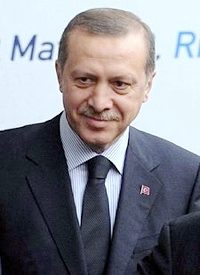
The Prime Minister of Turkey has a message for the 3 million people of Turkish origin now living in Germany: “You are part of Germany, but you are also part our great Turkey.” Speaking on February 27 to an audience of thousands gathered to hear him in Düsseldorf, Prime Minister Recep Tayyip Erdogan (picture, left) told his “compatriots” to resist assimilation into German society (“Yes, integrate yourselves into German society but don’t assimilate yourselves.”) even as he engaged in saber rattling as he stoked his audience: “Now Turkey will at last start building its own war planes.”
At the same time, Erdogan continues to press for Turkey to become a full member of the European Union — a move which would allow unrestricted Turkish immigration into the rest of the EU.
According to a story at Spiegel Online, Erdogan intended to provoke the nation that he was visiting: “Erdogan knows that this statement amounts to a provocation in Germany — no politician here is demanding that Turkish immigrants should deny their roots or give up their culture.” In this regard, Erdogan’s jingoist stunt is reminiscent of Mexican President Felipe Calderon’s infamous May 2010 tirade in Washington, D.C., when the ineffectual head of a failed state railed against the right of Americans to keep and bear arms and mocked Arizona’s efforts to stop the flood of Calderon’s citizens who were illegally entering the United States.
That many of the people in his audience may have been born in Germany, or had at least lived there for many decades was apparently of little concern to Erdogan. Erdogan speech was not only an effort to manipulate the sentiments of his audience; it was also directed toward voters ‘back home.’ As Spiegel Online reports, Erdogan has, at the least, mastered the politics of group identity and resentment:
He starts out by appealing straight to people’s hearts: “I am here to feel your yearning with you, I am here to enquire about your welfare. I am here to show that you’re not alone!”
Erdogan wants to give his audience a clear identity. “They call you guest workers, foreigners, or German Turks. It doesn’t matter what they all call you: You are my fellow citizens, you are my people, you are my friends, you are my brothers and sisters!” “You are part of Germany, but you are also part our great Turkey,” says Erdogan.
Such rhetoric is cheap, since inquiries regarding the welfare of 3 million people are far less costly than the actual financial burden for them which has fallen on the taxpayers of Germany. And Erdogan’s anti-assimilation diatribe risks drawing attention to the fact that Turks immigrants (and their descendants) are already failing to join German society. In January 2010, an article at TheLocal.de summarized the conclusions of a study of Turkish assimilation:
The study carried out by the Berlin-based Institute for Population and Development found that 30 percent of Turks and those of Turkish origin did not finish school and only 14 percent took the Abitur, or the final secondary school exam that is the required qualification for university. But more than 50 percent of those in other migrant groups manage to do the same, the report said.
The study, which Der Spiegel reported it had seen before its Monday release, compared for the first time the successful integration of individual migrant groups including those who have been naturalized in Germany. It has compiled a ranking of federal states based on the level of integration of its immigrants.Immigrants of Turkish origin were also found to be the least successful in the labour market: they are often jobless, the percentage of housewives is high and many are dependent on welfare, the study said. The state of Saarland was found to have the worst record – 45 percent of its Turks had no educational qualification of any kind.
Many of the Turks originally entered Germany as “guest workers,” but the fact is that such immigrants are now “often jobless” and apparently essentially uneducated. Germans — and other Europeans — have a legitimate right to ask what the effect of giving full EU membership to Turkey would mean for the whole of Europe. How many of the 73.9 million citizens of Turkey would find it advantageous to move elsewhere in the EU in search of jobs — or welfare?
Erdogan’s “great Turkey” rhetoric touches a very sensitive nerve in the history of Europe, which endured brutal invasion by the Turks into central Europe in the 16th and 17th centuries. (See: “The Battle of Vienna.”) Erdogan’s effort to pressure his former countrymen to refuse assimilation, claiming they are somehow part of a larger Turkish identity, while boasting of his nation’s military programs is more than provocative. And it makes the prospect of Turkish membership in the EU a proposal which is only slightly more popular in Europe today than when the Turks first sought such a relationship in 1529 and 1683, albeit by different means.



